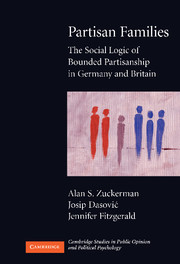Book contents
- Frontmatter
- Contents
- List of Figures and Tables
- Acknowledgments
- Preface: The Theoretical Approach, the Question, and the Data
- 1 The Social Logic of Partisanship: A Theoretical Excursion
- 2 Bounded Partisanship in Germany and Britain
- 3 A Multivariate Analysis of Partisan Support, Preference, and Constancy
- 4 Bounded Partisanship in Intimate Social Units: Husbands, Wives, and Domestic Partners
- 5 Bounded Partisanship in Intimate Social Units: Parents and Children
- 6 Partisan Constancy and Partisan Families: Turnout and Vote Choice in Recent British Elections
- Conclusion: Family Ties, Bounded Partisanship, and Party Politics in Established Democracies
- Appendix
- References
- Index
- Books in the Series
4 - Bounded Partisanship in Intimate Social Units: Husbands, Wives, and Domestic Partners
Published online by Cambridge University Press: 05 June 2012
- Frontmatter
- Contents
- List of Figures and Tables
- Acknowledgments
- Preface: The Theoretical Approach, the Question, and the Data
- 1 The Social Logic of Partisanship: A Theoretical Excursion
- 2 Bounded Partisanship in Germany and Britain
- 3 A Multivariate Analysis of Partisan Support, Preference, and Constancy
- 4 Bounded Partisanship in Intimate Social Units: Husbands, Wives, and Domestic Partners
- 5 Bounded Partisanship in Intimate Social Units: Parents and Children
- 6 Partisan Constancy and Partisan Families: Turnout and Vote Choice in Recent British Elections
- Conclusion: Family Ties, Bounded Partisanship, and Party Politics in Established Democracies
- Appendix
- References
- Index
- Books in the Series
Summary
Therefore, a man shall leave his mother and father and cling to his wife, and they shall be one flesh.
Genesis 2:2It is not good for man to be alone.
Genesis 2:18God always pairs off like with like.
The Iliad, XVII, 1:218Others, on the contrary, hold that all similar individuals are mutually opposed.
Aristotle, Nicomechean Ethics 1155a: 214–16Families stand as the primary social units; households are recurrent locations for social interactions. No matter that there are other partners in conversation – parents, children, friends, neighbors, workmates, and acquaintances – people talk to their spouses and domestic partners. In all these intimate social units, not only words but groans, smiles, frozen silences, grimaces, laughter, and shouts convey preferences. No matter the level of interest of politics in the household, the greater the number of thoughts exchanged, the more they discuss politics (Walsh 2004).
Families are the primary locus of political discussions; here, national politics enters the personal space of each citizen (Glaser 1959–60; Hays and Bean 1992; March 1953–4; Stoker and Jennings 1995; Verba, Schlozman, and Burns 2005; and Zuckerman and Kotler-Berkowitz1998). Absent information on these issues in GSOEP or BHPS, we bring illustrative evidence from other sources. For example, in 1987, more than 0.75 of Britons report that the person with whom they most frequently discuss politics is a family member who lives in their household; 0.66 single out their spouse or live-in partner as that person; 0.30 talk politics with no one but family members, and less than 0.05 do not include a family member among the two persons with whom they most frequently discuss politics (Zuckerman, Kotler-Berkowitz, and Swaine 1998).
- Type
- Chapter
- Information
- Partisan FamiliesThe Social Logic of Bounded Partisanship in Germany and Britain, pp. 71 - 90Publisher: Cambridge University PressPrint publication year: 2007
- 1
- Cited by



